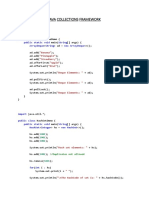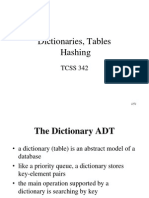The Curious Case of Java String HashCode
Uploaded by
NikolaMilosevicThe Curious Case of Java String HashCode
Uploaded by
NikolaMilosevicProgramming Become a member Sign in Get started
You have 2 free stories left this month. Sign up and get an extra one for free.
The curious case of Java String
HashCode
Animesh Gaitonde Follow
Oct 11, 2019 · 5 min read
Introduction
I have been programming in Java since the past 1.5 years. Recently, I was
experimenting with performance analysis of Java Data structures. To get
my hands dirty, I decided to play around with my favourite data structure
i.e HashSet. HashSet provides an O(1) lookup and inserts time. I
measured & compared the time taken to lookup random strings having
different sizes in a HashSet.
Following is the code snippet that was written by me:-
1 package performance;
2
3 import com.google.common.base.Stopwatch;
4
5 import java.util.*;
6
7 public class HashCodePerformance {
8 public static void main(String[] args) {
9 Set<String> stringHashSet = new HashSet<>();
10 stringHashSet.add("London");
11 stringHashSet.add("Mumbai");
12 stringHashSet.add("NewYork");
13 List<String> stringsToSearch = Arrays.asList("f5a5a608", "48abre7a6 i8a5r507",
14 "7e50bc488 pl43fvf1p 65", "e843r6f1p vfvdfv vdvdg vgbgd ", "38aeaf9a6");
15 for (String string : stringsToSearch) {
16 Stopwatch timer = Stopwatch.createStarted();
17 for (int index=0; index < 10000000; ++index) {
18 stringHashSet.contains(string);
19 }
20 System.out.println("Search String \"" + string + "\" time taken " + timer.st
21 }
22 }
23 }
JavaPerformance.java hosted with ❤ by GitHub view raw
Let’s have a look at the performance of the lookup done for random
strings:-
Performance of string lookup
We come across an interesting observation. The first & the last string
lookup (highlighted in red) takes almost 3x to 4x time than the middle
three strings. Even though the length of the middle three strings is more,
still the lookup is far more efficient. This implies HashSet lookup is
independent of the string’s length.
To understand this unusual behaviour of HashSet, let’s get back to the
basics and understand the fundamentals.
HashSet- Internal Working
Java HashSet internally uses an array of lists to perform an O(1)
insertion, lookup and deletion. HashSet first calculates the hash of the
object to determine the array index where the object will be stored.
Later, the object is stored at the calculated index. The same principle is
applied during lookup & deletion.
How HashSet/HashMap stores objects
Accessing an array element is O(1) operation, so the only overhead is
calculating the hash of the object. Hence, the hash function needs to be
optimal to avoid any performance impact.
Furthermore, the output of the Hash function should have a uniform
distribution. In case of collisions, the length of lists at a given index will
keep growing and worst-case complexity will become O(n).
HashSet/HashMap collisions as a result of non-uniform hashing
HashCode Design
In Java, every object has a hashCode() function. HashSet invokes this
function to determine the object index. Let’s revisit the example where
were analysing the performance of string lookup and see the value of
hashCodes for the random strings.
HashCode of random strings in the example
We can see that the outlier strings have hashCode as 0. Now, its time to
dig into some code & glance at the implementation.
In the older versions of JDK 1.0+ and 1.1+, hashCode function for
strings sampled every nth character. The downside of this approach was
many strings mapped to the same hash and resulted in collisions.
In Java 1.2, the below algorithm is used. This is a bit slow but helps in
avoiding collisions.
Calculation of String’s HashCode
1 public int hashCode() {
2 int h = hash;
3 if (h == 0 && value.length > 0) {
4 char val[] = value;
5
6 for (int i = 0; i < value.length; i++) {
7 h = 31 * h + val[i];
8 }
9 hash = h;
10 }
11 return h;
12 }
StringHashCode.java hosted with ❤ by GitHub view raw
It can be seen from the above code that when hashCode is called for the
first time, the default value of the variable hash will be 0 and line 3–9 will
be executed. Subsequent calls to hashCode() will not execute line 3–9 if
the hash is non-zero.
It can be inferred that the hashCode() function uses a caching approach
where the hash is calculated only the first time its called and later calls
will get the same calculated value.
If the hash of a string is 0, then the hash computation will be done every
time the function is called. Now, it is clear why the lookup of a few strings
takes more time than others.
Overcoming the performance penalty
The above HashCode computation performs poorly for strings that hash
to 0. How can we optimize this?
Any CS101 student would recommend using a boolean flag that will be
set after the first computation and would skip computations in the
subsequent calls.
1 public int hashCode() {
2 int h = hash;
3 if (!computed && value.length > 0) {
4 char val[] = value;
5
6 for (int i = 0; i < value.length; i++) {
7 h = 31 * h + val[i];
8 }
9 hash = h;
10 computed = true;
11 }
12 return h;
13 }
HashCodeOptimized.java hosted with ❤ by GitHub view raw
You might now be wondering why didn’t Java developers think of this
optimization in the first place or why wasn’t this patched in the later
releases of Java?
Why not fix HashCode?
As per the implementation, the following is the formula of the hash of
any String having ’n’ characters.
hash = s[0]*31^(n-1) + s[1]*31^(n-2) + ... + s[n-1]
here s[n] is the nth character in the string
This hash function provides uniform distribution of hash across the
range of integers. It implies that the probability of a string hashing to 0 is
1 in ²³² strings.
We can think of the below cases where the string can hash to zero:-
1. String only contains 0 (Unicode character)
2. Empty String
3. Hash code is 0 as a result of integer overflow
In real-world applications, the probability of getting such kind of strings
is minuscule.
Fixing the hashCode implementation is trivial & Java developers might
have thought about it. However, there is no added advantage in fixing it.
Currently, only strings that hash to 0 are impacted. Let’s say we fix the
hashCode by adding a boolean. Overall, we won’t see any huge impact on
the performance of a real-world system. It might result in 0.000010 %
improvement in speed. It’s analogous to saying we optimized a task that
could be finished in 1hr to 59 min 59 sec 7 milliseconds.
So, we are better off not making any change in the hashCode() by
introducing a new variable as there is no significant speed gain.
English Strings that hash to 0
I took a list of 20k English Dictionary words and tried combining the
words to check if they hash to zero. When I considered single meaningful
English words, none of them hashed to zero. Combination of two or
more words resulted in a zero hash.
Few are some examples of sentences (meaningful words)that hash to
zero:-
carcinomas motorists high
zipped daydreams thunderflashes
where inattentive agronomy
drumwood boulderhead
HashSet or HashMaps showcase the best behaviour in getting, setting or
deleting the value. However, there are cases where the performance can
get impacted due to unusual behaviour.
References:-
https://stackoverflow.com/questions/2310498/why-doesnt-strings-
hashcode-cache-0
https://www.geeksforgeeks.org/equals-hashcode-methods-java/
Data Structures Programming Java Algorithms Computer Science
280 claps 2 responses
WRIT T EN BY
Animesh Gaitonde Follow
Software Engineer. Interested in Distributed Computing,
Data Science, Cryptocurrencies & Stock Markets.
More From Medium
Creating the T-Rex Updating Your Unity Four shortcuts for Handling Errors With
game with Flutter and Project to Watson SDK nding bugs in a large or Swift Result Type
Flame for Unity 3.1.0 (and Core unfamiliar codebase Navdeep Singh in Better
Renan C. Araujo SDK 0.2.0) Adam Dudley in T he Startup Programming
Amara Graham
SQL for Data Scientists, First steps to SQL! Guix Packaging by Angular Flex-Layout:
in 6 Minutes or Less tugce satir in Analytics Vidhya Example Flexbox and Grid Layout
Andre Ye in Analytics Vidhya Jethro Cao in T he Startup for Angular Component
Suguru Inatomi in Angular In
Depth
Discover Medium Make Medium yours Become a member
Welcome to a place where words matter. On Medium, Follow all the topics you care about, and we’ll deliver the Get unlimited access to the best stories on Medium — and
smart voices and original ideas take center stage - with no best stories for you to your homepage and inbox. Explore support writers while you’re at it. Just $5/month. Upgrade
ads in sight. Watch
About Help Legal
You might also like
- Ken's Java Notes: Jar - Manifest (Sample File)No ratings yetKen's Java Notes: Jar - Manifest (Sample File)16 pages
- Java - Lang: 1. The Basic Java ApplicationNo ratings yetJava - Lang: 1. The Basic Java Application9 pages
- Hash Table Time Costs - Hash Functions - The Map Interface and ImplementationsNo ratings yetHash Table Time Costs - Hash Functions - The Map Interface and Implementations25 pages
- Hashing: Hash Functions Collision Resolution ApplicationsNo ratings yetHashing: Hash Functions Collision Resolution Applications50 pages
- Sets and Maps: Part of The Collections FrameworkNo ratings yetSets and Maps: Part of The Collections Framework23 pages
- Practicing at The Cutting Edge: Learning and Unlearning About PerformanceNo ratings yetPracticing at The Cutting Edge: Learning and Unlearning About Performance104 pages
- FALLSEM2024-25_TCSE201E_ETH_VL2024250105691_2024-09-09_Reference-Material-I (1)No ratings yetFALLSEM2024-25_TCSE201E_ETH_VL2024250105691_2024-09-09_Reference-Material-I (1)21 pages
- 06_ HashMap & HashSet and how do they internally work_ What is a hashing function_ _ 800+ Big Data & Java Interview FAQsNo ratings yet06_ HashMap & HashSet and how do they internally work_ What is a hashing function_ _ 800+ Big Data & Java Interview FAQs7 pages
- Overview of Java Arraylist, Hashtable, Hashmap, Hashet, LinkedlistNo ratings yetOverview of Java Arraylist, Hashtable, Hashmap, Hashet, Linkedlist11 pages
- Java - CollectionFramework - Examples ANo ratings yetJava - CollectionFramework - Examples A11 pages
- Index UNIT - II: Regular Expressions No: Khit, CseNo ratings yetIndex UNIT - II: Regular Expressions No: Khit, Cse11 pages
- Get Algorithms and Theory of Computation Handbook Second Edition Volume 1 General Concepts and Techniques Chapman Hall CRC Applied Algorithms and Data Structures series Mikhail J. Atallah free all chapters100% (3)Get Algorithms and Theory of Computation Handbook Second Edition Volume 1 General Concepts and Techniques Chapman Hall CRC Applied Algorithms and Data Structures series Mikhail J. Atallah free all chapters77 pages
- Practice Set: Operation Research (BMA342)No ratings yetPractice Set: Operation Research (BMA342)10 pages
- 544 39 Solutions-Instructor-Manualchapter 3No ratings yet544 39 Solutions-Instructor-Manualchapter 320 pages
- Lesson 3: Mind Reader Game - Improving The Algorithm: Teacher-Student ActivitiesNo ratings yetLesson 3: Mind Reader Game - Improving The Algorithm: Teacher-Student Activities13 pages
- The First Question (0 Points) : CSE 373, Spring 2012 Midterm SolutionsNo ratings yetThe First Question (0 Points) : CSE 373, Spring 2012 Midterm Solutions8 pages
- Algorithm Analysis and Design: Aad Cse Srm-Ap 1No ratings yetAlgorithm Analysis and Design: Aad Cse Srm-Ap 141 pages
- Linear Programming Applications: Assignment ProblemNo ratings yetLinear Programming Applications: Assignment Problem27 pages
- Design and Analysis of Algorithms: Mordecai GolinNo ratings yetDesign and Analysis of Algorithms: Mordecai Golin22 pages
- Fixed and Floating Point Numbers: Dr. Ashish GUPTA Sense, Vit-Ap Ashish - Gupta@vitap - Ac.inNo ratings yetFixed and Floating Point Numbers: Dr. Ashish GUPTA Sense, Vit-Ap Ashish - Gupta@vitap - Ac.in34 pages
- Linearprogramming Problems With SolutionNo ratings yetLinearprogramming Problems With Solution8 pages
- Nonparametric Density Estimation Nearest Neighbors, KNNNo ratings yetNonparametric Density Estimation Nearest Neighbors, KNN31 pages

































































































